Pre-employment screening helps companies find the best candidates for open roles. It gives recruiters objective data to evaluate applicants beyond just resumes and interviews.
This guide compares Adaface and Thomas to help you choose the right assessment platform for your hiring needs. We'll look at key features, strengths, and differences between the two options.
Explore this post with:
Table of contents
How does Adaface work?
Adaface is your go-to platform for candidate assessments, offering a broad range of tests to evaluate various skills. From programming to soft skills, Adaface ensures you get a well-rounded view of each candidate.
Recruiters use Adaface to streamline their hiring process with high-quality assessments tailored to match job descriptions. This customization ensures the questions are relevant and specific, making it easier to identify the best-fit candidates.
Another key use case is Adaface's scenario-based MCQs combined with coding questions, which are perfect for roles requiring both theoretical knowledge and practical expertise. This dual approach ensures you assess candidates comprehensively.
One standout feature is Adaface's unique proctoring capabilities, including webcam and web proctoring, to maintain test integrity. These features help ensure assessments are fair and secure, something not all competitors offer.
How does Thomas work?
Thomas is an assessment provider that focuses on helping organizations better understand their people. They provide various tools designed to measure personality, cognitive abilities, and interpersonal skills, giving employers a clearer picture of how a candidate might fit within their team.
Their process typically involves a mixture of situational judgment tests and personality assessments. For example, a company might use Thomas's tools to assess how candidates would handle specific workplace scenarios, allowing them to gauge both their skills and decision-making approach in real-time.
Some of Thomas's notable features include their situational judgment assessments and ready-to-use test library. These help organizations save time and ensure they have a structured approach to evaluating potential hires without having to customize everything from scratch.
However, it's worth mentioning that Thomas lacks certain critical test types, like programming assessments and customizable questions. This gap can limit their ability to assess technical candidates effectively, which might be a drawback for organizations seeking a comprehensive evaluation across various job roles.
Adaface vs Thomas: Test libraries
Adaface offers a broad library of tests covering wide-ranging skills from programming to artificial intelligence. Thomas's test library, while extensive, doesn't cover as many technical and role-specific skills as Adaface's offerings.
Using these test libraries can help recruiters make more informed hiring decisions, streamline candidate evaluation, and reduce employee turnover. A robust test library ensures you have the right tools to evaluate every potential hire precisely.
Adaface's test library
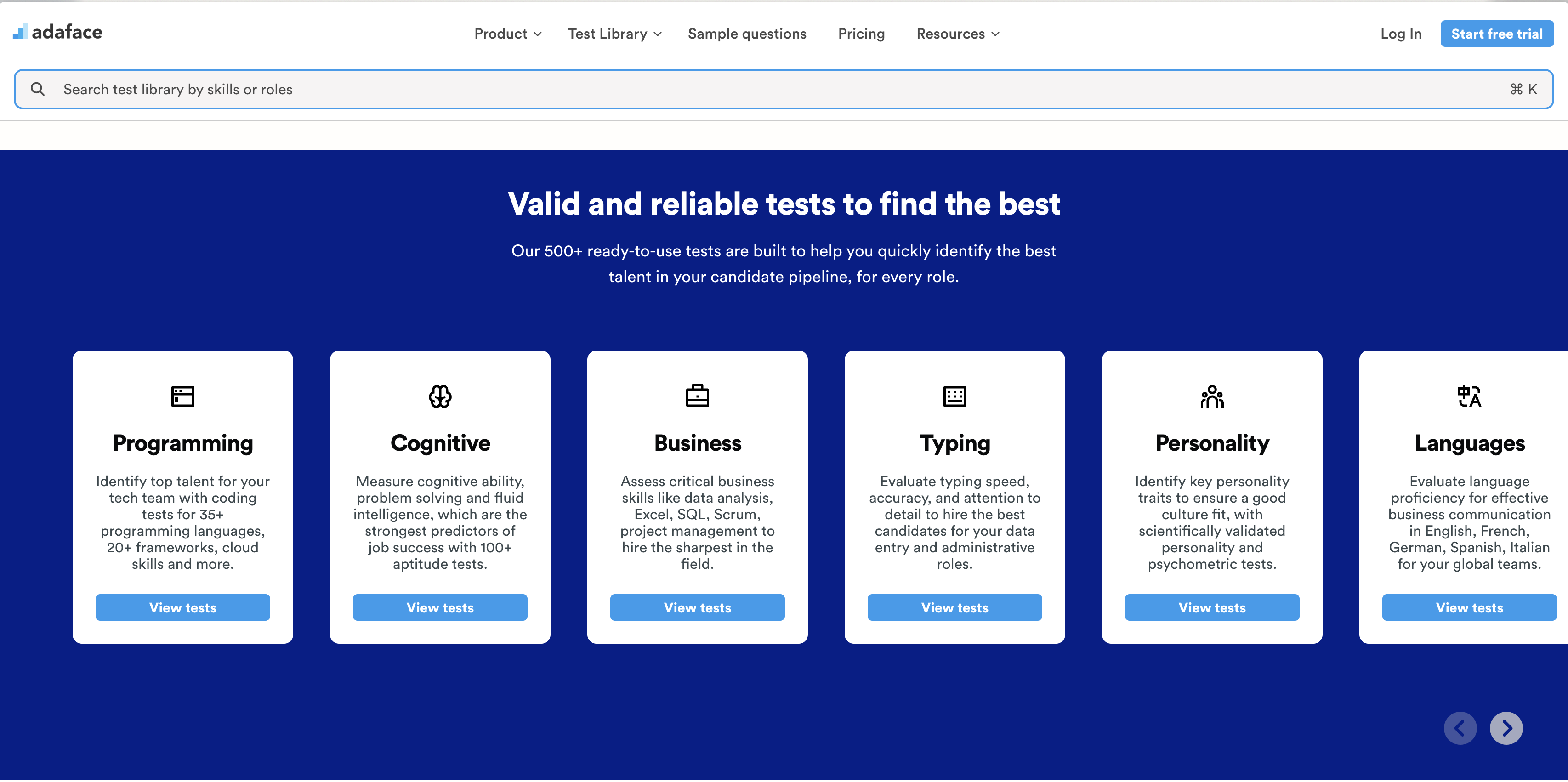
Adaface’s test library includes assessments for a wide variety of skills and sectors. You’ll find tests for programming, situational judgment, aptitude, business skills, typing, personality, languages, finance, artificial intelligence, cloud computing, and role-specific skills.
Recruiters use Adaface’s test library because it allows them to assess a comprehensive range of skills. From coding and technical skills to soft skills and job-specific scenarios, Adaface provides a nuanced picture of a candidate’s abilities.
Using Adaface, recruiters can create custom assessments tailored to specific job descriptions, ensuring they're testing for the most relevant skills. Ready-to-use tests also mean you can start evaluating candidates right away.
Thomas's test library
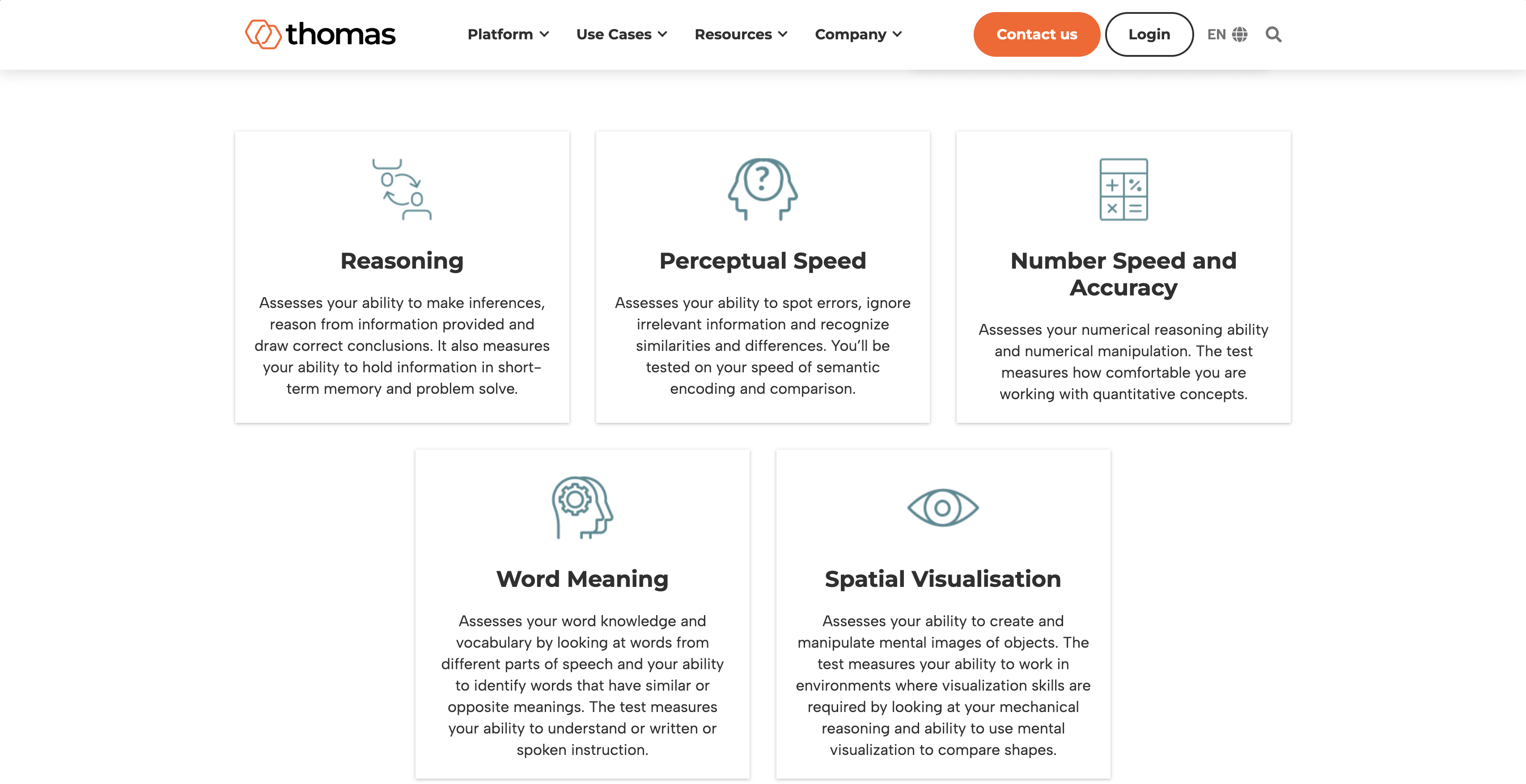
Thomas offers a test library that includes aptitude and situational judgment tests, providing a variety of assessments to gauge candidate skills and decision-making abilities. However, it notably lacks programming, business, and language tests, which are crucial for many tech and international roles.
One of the selling points of Thomas's library is its situational judgment tests, which help employers understand how candidates might handle real-world scenarios in the workplace. This can be particularly useful for roles that require quick thinking and adaptability.
While Thomas provides some ready-to-use tests, it falls short in offering customizable tests tailored to specific job descriptions or the ability to add unique questions, meaning clients may struggle to find assessments that fully align with their hiring needs.
Comparison of test libraries
Adaface vs Thomas: Business, Marketing and Ops Roles
Adaface specializes in evaluating a candidate's on-the-job skills through comprehensive testing that includes both technical and non-technical areas, making it a top choice for recruiters. Comparatively, Thomas offers assessments focusing more on personality and situational judgement, lacking in some technical areas crucial for certain roles.
Adaface boasts an extensive library of over 500+ tests, covering a wide range of domains like programming, business, and finance, offering scenario-based MCQs and coding questions. Thomas, on the other hand, provides tests primarily in personality and aptitude, with less focus on role-specific technical assessments.
Business, Marketing and Ops Roles with Adaface
Adaface equips recruiters with a plethora of functionalities to screen role-based skills, such as:
- Programming tests with scenario-based MCQs
- Aptitude and Reasoning tests for logical, numerical, and verbal skills
- Customized tests tailored to job descriptions
- Finance and business skills assessments
Recruiters prefer Adaface for its ability to customize tests to the specific requirements outlined in the job description. This ensures a more accurate assessment of whether a candidate has the skills necessary to thrive in their role, making the hiring process smoother and more efficient.
Adaface also allows recruiters to create custom questions and add them to tests, providing greater flexibility in evaluating candidates. Moreover, the platform's user-friendly interface ensures a seamless experience for both recruiters and candidates, making it an attractive option for businesses seeking versatile assessment solutions.
Hiring Business, Marketing and Ops Roles with Thomas
Thomas offers a range of assessments tailored for non-developer roles, including situational judgment and personality tests. However, their library falls short in specific job-related skills and other essential areas like finance or typing, limiting their applicability in certain hiring scenarios.
The test library at Thomas is designed to cover various non-dev roles, allowing hiring managers to select from situational judgment and aptitude tests. This can be useful for gauging a candidate's decision-making skills in workplace scenarios, although the absence of role-specific assessments may leave gaps in evaluating practical job capabilities.
While Thomas provides a decent selection of assessments, it lacks options for job-specific tests and doesn't support custom questions tailored to unique company needs. This can hinder recruiters looking for a more personalized approach to evaluate candidates for specific non-developer positions.
Adaface vs Thomas: Developer hiring
When it comes to hiring developers, tests are like your trusty map—they help you navigate the vast talent landscape to find the right fit for your team. By assessing technical skills, coding ability, and problem-solving aptitude, recruiters can pinpoint candidates who can truly contribute.
Both Adaface and Thomas offer a variety of tests, including coding challenges and scenario-based quizzes. However, Adaface takes it a step further by providing a richer mix of assessments that cover programming languages, web frameworks, and coding best practices.
Hiring developers with Adaface
Adaface shines in its functionalities for hiring developers, providing a blend of coding questions and multiple choice quizzes to gauge hands-on skills and theoretical knowledge. The platform also features custom coding questions, making it adaptable to your unique hiring needs.
In contrast, Thomas lacks comprehensive test options, offering limited assessments that may not effectively evaluate the breadth of a developer's skills. This gap can lead to missing out on qualified candidates who could bring real value to your organization.
Adaface's functionalities include: - Programming and SQL coding questions - Data Structures and Algorithms assessments - Code playback for candidate evaluation - Automated scoring for quick results - Custom coding questions tailored to your requirements. These features make it a preferred choice for recruiters aiming for a thorough evaluation.
Recruiters choose Adaface because it streamlines the hiring process, allowing for swift identification of top-tier talent. Users appreciate the ability to assess candidates across various skills, ensuring a well-rounded evaluation.
Additionally, Adaface's test library encompasses over 500 skills, enabling recruiters to find specific assessments, such as those for programming tests or language tests. This level of flexibility enhances the hiring experience, making it both effective and enjoyable.
Hiring developers with Thomas
Thomas doesn't offer programming assessments or coding questions in their test library. Their focus appears to be on personality and behavioral assessments rather than technical skills evaluation for developers.
While Thomas excels in measuring soft skills and cultural fit, it may not be the best choice for companies looking to assess candidates' coding abilities or technical knowledge in programming languages, frameworks, or algorithms.
The lack of coding assessments means Thomas can't provide insights into a developer's practical skills, problem-solving abilities in code, or familiarity with specific technologies. This limitation may require additional steps in the hiring process to evaluate technical competencies.
Comparison of developer hiring features
Adaface vs Thomas: Candidate experience and company branding
The candidate experience isn't just an added bonus; it's a critical piece of your hiring puzzle. If candidates feel valued and well-treated during assessments, they're more likely to associate positive feelings with your brand, improving overall engagement.
When evaluating assessment platforms, pay attention to features that enhance this experience. Look for mobile compatibility, quick-support options, and a candidate-friendly interface. All these can significantly impact test completion rates and, ultimately, your employer branding.
Candidate experience and company branding with Adaface
Adaface offers a conversational interface that transforms the traditional test-taking experience into a more engaging dialogue. This approach not only makes assessments feel less daunting but also increases completion rates as candidates feel more at ease.
In addition, Adaface provides email support, ensuring candidates have resources to resolve any queries quickly. This accessibility reassures candidates that they are supported throughout the assessment process, reinforcing a positive perception of your brand.
Customization options are another feather in Adaface's cap. Companies can personalize invitations, rejections, and branding elements like logos and colors, creating a cohesive brand image. Such personalization solidifies candidates' recognition of your brand and makes the hiring process feel more inviting.
Candidate experience and company branding with Thomas
Thomas assessments are mobile-friendly, allowing candidates to complete tests on their smartphones. The typical assessment length varies from 8 to 45 minutes, which strikes a balance between being thorough and considerate of candidate time.
However, Thomas lacks some key elements in company branding. The platform does not feature customizable invitation templates, company logos, or brand colors. This means candidates may not get the full sense of your company's identity during the assessment process.
One unique aspect of candidate experience with Thomas is the absence of help documentation and qualifying questions. Candidates might find it challenging to get immediate answers or understand if they meet basic criteria before diving into a full assessment.
Adaface vs Thomas: Anti-cheating features
In today's world of online assessments, ensuring a fair and secure testing environment is crucial. Anti-cheating measures are essential to maintain the integrity of the evaluation process, enabling recruiters to make informed hiring decisions based on accurate results.
Anti-cheating features of Adaface
At Adaface, we take anti-cheating measures very seriously. Our platform employs a multi-layered approach to prevent any form of cheating or unfair practices during assessments.
- User Authentication: We require candidates to authenticate themselves before starting the test, ensuring that only the intended individual can access the assessment.
- Time Limits: Tests are timed at the question level, preventing candidates from taking excessive time and ensuring accurate scoring.
- Web and Webcam Proctoring: We track browser activity and capture webcam footage (with consent) to monitor any suspicious behavior during the test.
- Location and IP Tracking: Adaface logs the candidate's location and IP address, allowing us to flag any potential cases of multiple candidates taking the test from the same location or device.
Furthermore, Adaface employs Device Fingerprinting to uniquely identify each candidate's device, providing an additional layer of security. Our Full-Screen Proctoring feature ensures that candidates remain focused on the test by preventing them from switching to other applications or browser windows. We also have robust Chat GPT Protection measures in place to detect any attempts to use AI-assisted tools during the assessment.
Anti-cheating features of Thomas
Thomas offers some basic anti-cheating features for their assessments. They implement user authentication and set time limits on tests to help maintain test integrity.
These measures can be useful for companies looking to prevent basic forms of cheating during remote assessments. Time limits, in particular, can make it harder for candidates to look up answers or get help from others.
However, Thomas lacks more advanced proctoring features like web monitoring, webcam tracking, or IP logging. Without these, it may be challenging to fully verify a candidate's test-taking environment or prevent all forms of potential cheating.
Comparison of anti-cheating features
Adaface vs Thomas: Pricing and free trial
When it comes to pre-employment assessment tools, pricing can be a bit of a puzzle. Some providers keep their costs under wraps, while others offer transparent pricing models. As a recruiter, you want a clear picture of what you're paying for and how it fits your budget.
Adaface pricing
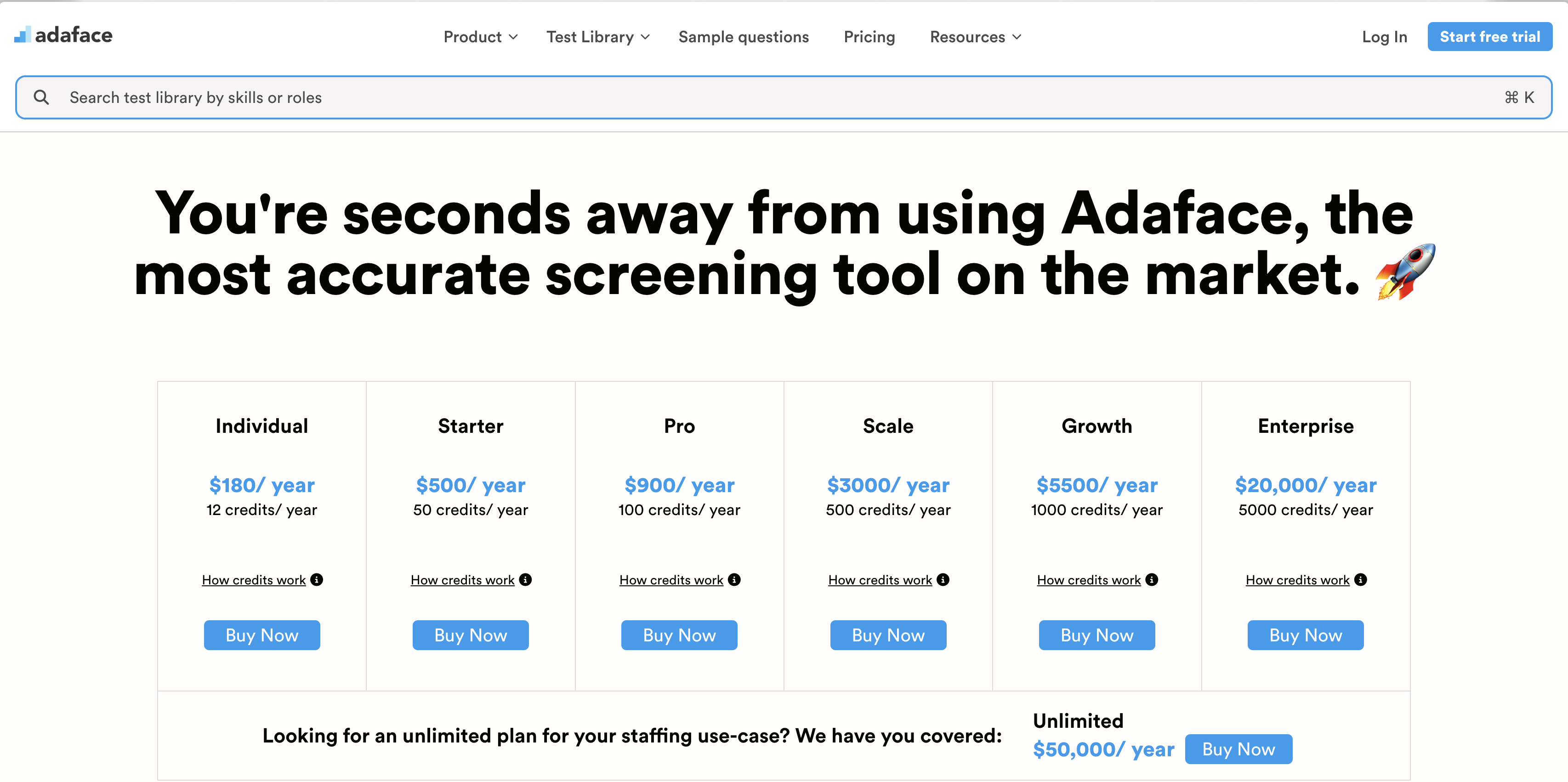
At Adaface, we believe in keeping things simple and transparent. Our pricing is designed to suit various hiring needs and team sizes. We offer both pay-as-you-go and subscription options, giving you the flexibility to choose what works best for your organization.
Our pricing structure includes:
- Starter Plan: Perfect for small teams, starting at $500 for 50 credits
- Scale Plan: Ideal for growing companies, at $3000 for 500 credits
- Growth Plan: For larger organizations, priced at $5500 for 1000 credits
- Enterprise Plan: Tailored for big corporations, starting at $20,000 for 4000 credits
- Unlimited Plan: For high-volume hiring, at $50,000 per year for unlimited assessments
We understand that every company has unique hiring needs. That's why we offer a free trial, allowing you to explore our platform and all its features before making a decision. Plus, you can easily sign up and start using Adaface right away, without waiting for sales calls or form approvals. It's all about making your hiring process smoother and more efficient.
Thomas pricing
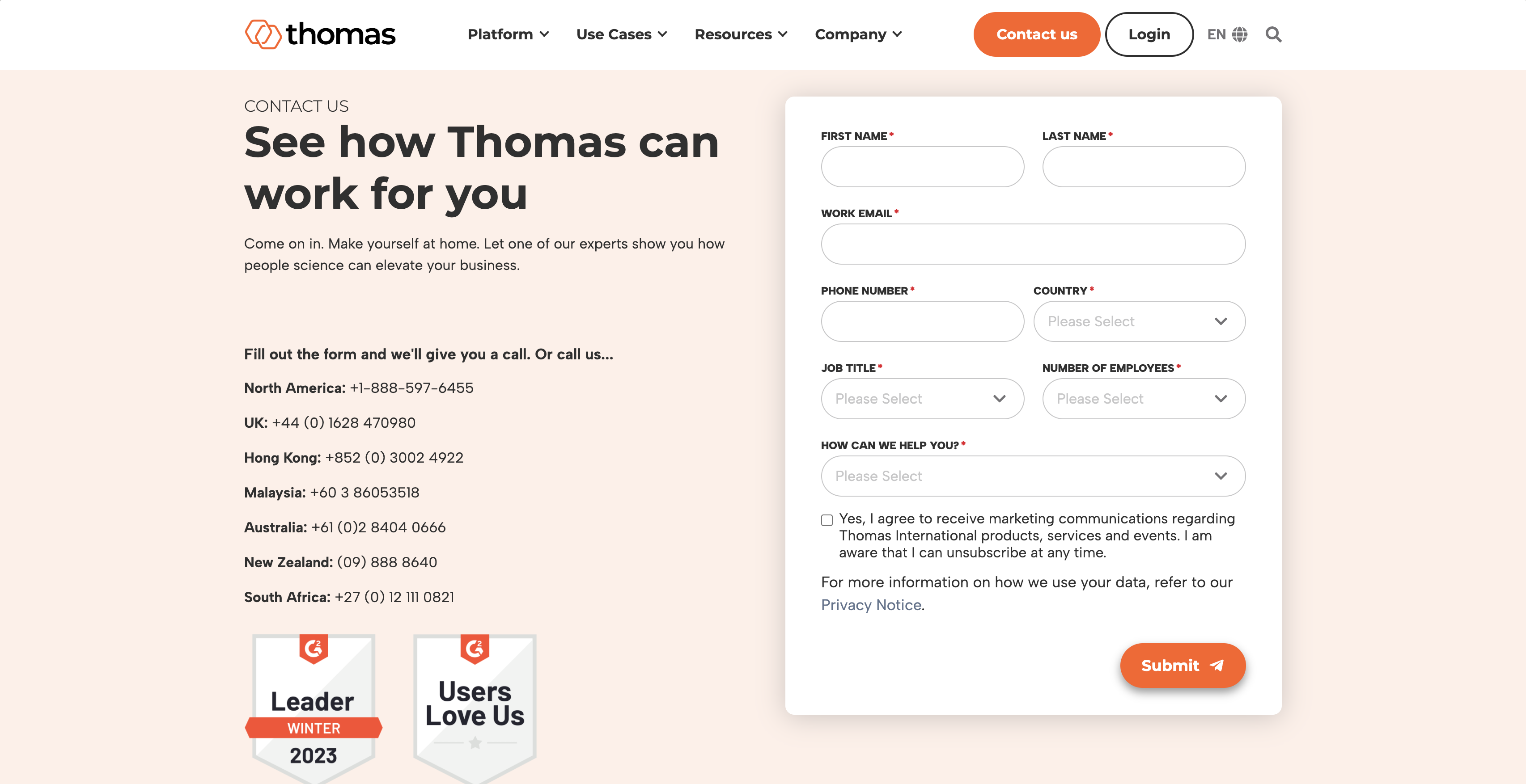
Thomas International's pricing information isn't readily available on their website. If you're interested in their plans, you'll need to contact Thomas International for a personalized quote. Unfortunately, this means there's no quick way to compare costs or see which plan might fit your needs without getting on a call or filling out a form.
Without public pricing details, potential customers face a few hurdles. There's no free trial to explore the platform before making a decision, and you can't just sign up and explore all features on your own. This lack of transparency can make it tricky to understand what you're getting into and can slow down the decision-making process.
Comparison of pricing
Adaface vs Thomas: Scorecards, reporting and analytics
Scorecards, reporting, and analytics features are the backbone of any recruitment platform. They help recruiters understand candidate performance, make data-driven decisions, and streamline the hiring process. A product with solid scorecards, reporting, and analytics can significantly enhance the efficiency and effectiveness of hiring teams.
Adaface scorecards, reporting and analytics
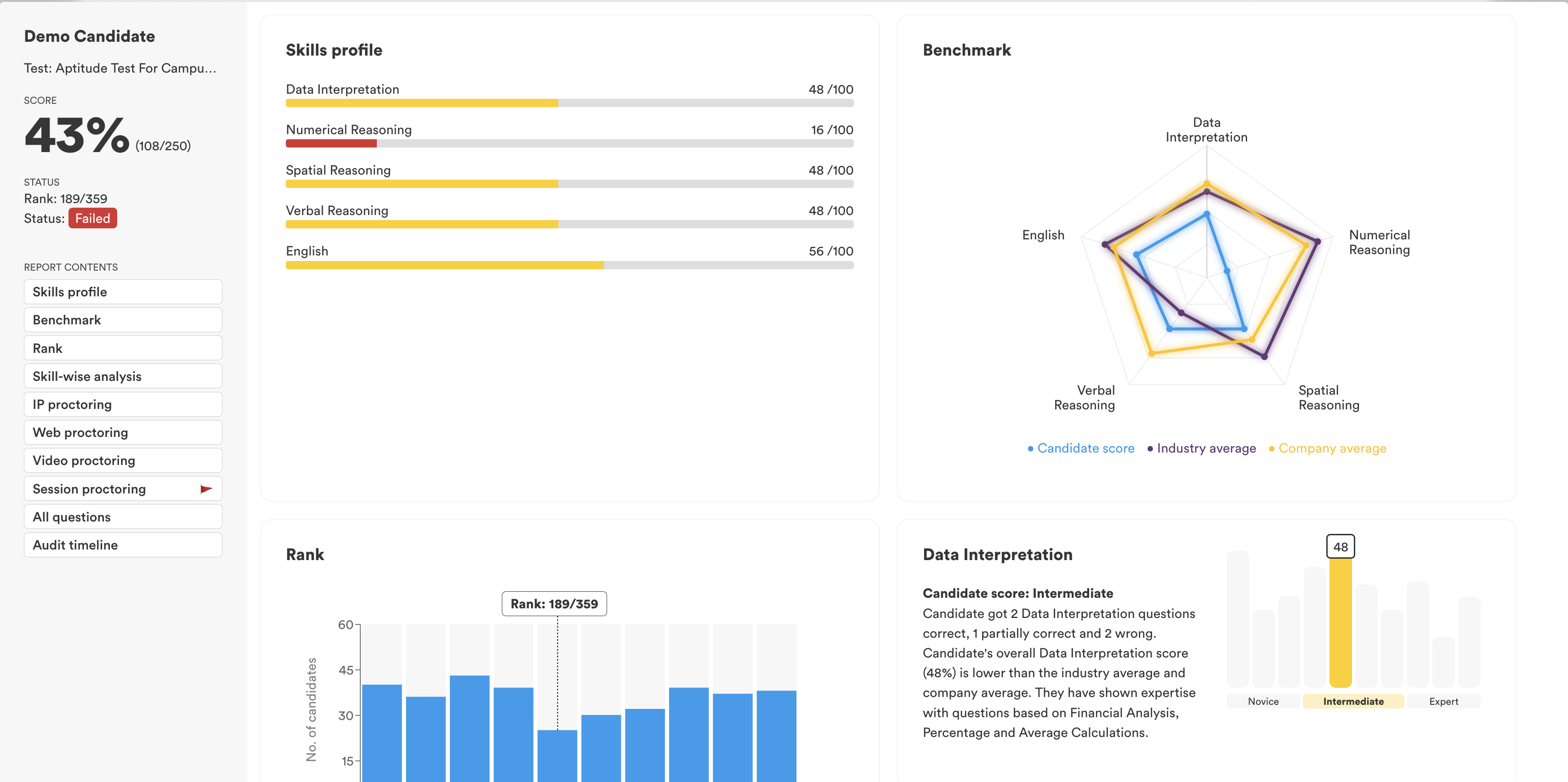
Adaface excels in offering detailed and user-friendly scorecards, reporting, and analytics features. With Adaface, recruiters receive comprehensive PDF reports that can be shared internally and externally. The platform also provides public links for easy sharing with clients who may not have access to the dashboard.
Adaface allows the export of candidate data in Excel and CSV formats, making internal evaluations seamless. Benchmarking against a pool of candidates helps recruiters quickly identify top talent. Additionally, the skills profile feature, complete with radar charts, provides a quick yet detailed view of candidate performance across multiple skills.
Adaface's detailed audit timeline offers all proctoring logs, allowing recruiters to delve into the nitty-gritty if needed. A single view for comparing multiple candidates' skill scores makes the evaluation process simpler. Automated scorecard generation and real-time alerts ensure that recruiters can move swiftly in the hiring process.
Thomas scorecards, reporting and analytics
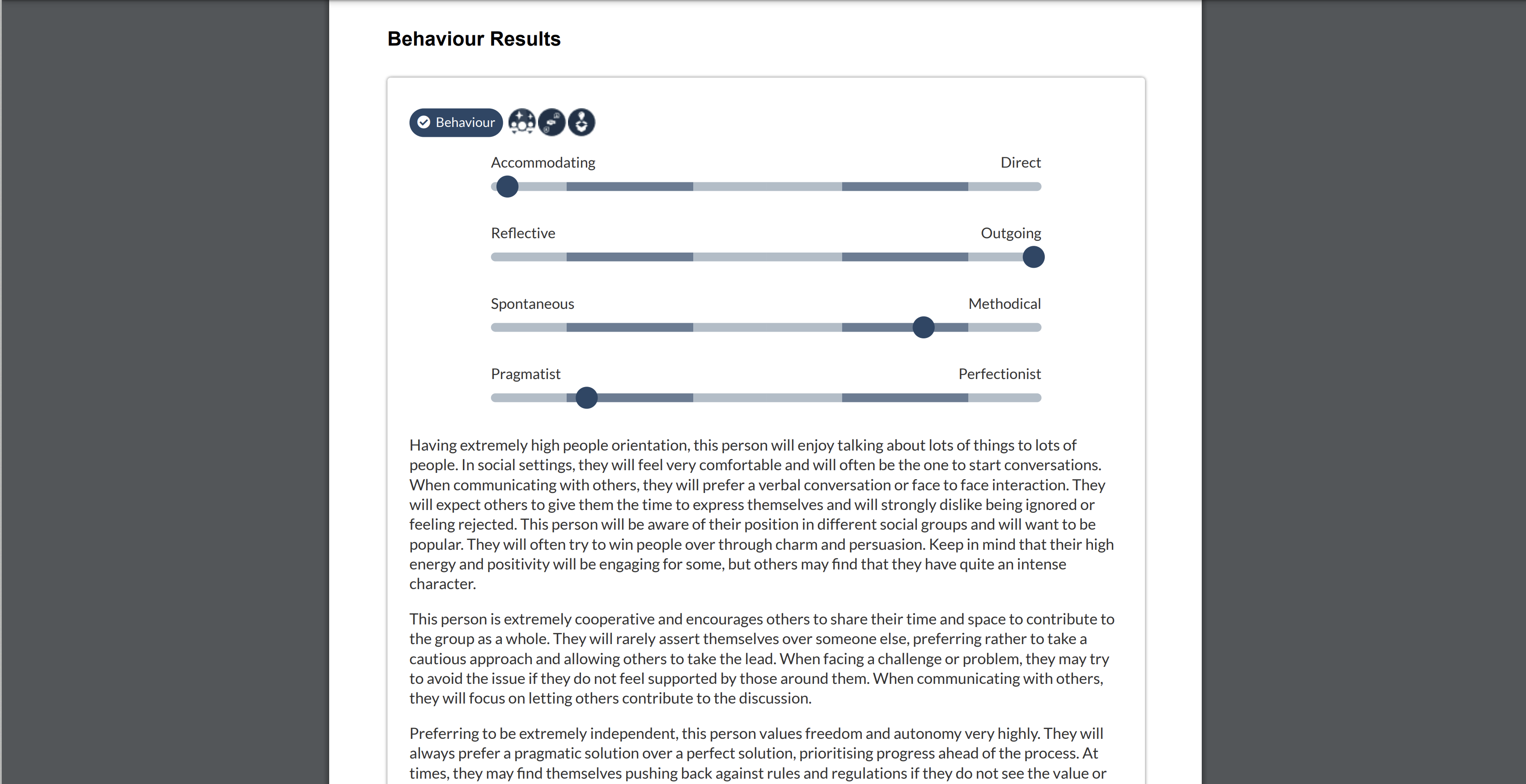
Thomas offers PDF reports for candidate assessments, allowing recruiters to share results internally or with clients. The platform includes benchmarking features to compare candidates against others in the pool, helping identify top performers.
The scorecards provide a skills profile, giving a quick overview of how candidates performed in each tested area. Thomas also generates automated reports and sends alerts to recruiters when candidates complete tests, speeding up the hiring process.
While Thomas covers basic reporting needs, it lacks some advanced features. The platform doesn't offer public report sharing via unique links, Excel or CSV exports for data analysis, or a detailed audit timeline for proctoring logs.
Comparison of scorecards, reporting and analytics
Adaface vs Thomas: Enterprise and startup friendliness
When choosing a pre-employment testing platform, look for features that support companies of all sizes. Key attributes include ATS integration, GDPR compliance, and API access.
Adaface's enterprise and startup friendliness
Adaface offers a suite of enterprise-friendly features. These include integrations with popular ATS systems, GDPR compliance, and a custom API for seamless workflow integration.
For companies hiring at scale, Adaface provides bulk actions and multiple invite options. This streamlines mass hiring events like campus recruitment.
Startups benefit from Adaface's unlimited team seats and role-based access. The platform grows with your company, supporting both small teams and large enterprises.
Thomas's enterprise and startup friendliness
Thomas offers ATS integrations and GDPR compliance for enterprise users. They provide role-based access control, allowing different team members varying levels of system access.
For startups and enterprises, Thomas's role-based access feature can help manage team permissions effectively. This allows organizations to control who can view sensitive candidate data or make hiring decisions.
However, Thomas lacks some features that could benefit larger organizations or those hiring at scale. These include custom API access, bulk actions for mass hiring events, and multiple question sets to prevent test leakage.
Comparison of enterprise and startup friendliness
Adaface vs Thomas: Assessment quality control
Quality control in assessments ensures that tests are reliable and accurately measure a candidate's abilities. Recruiters need this to make informed hiring decisions.
Adaface's quality control features
Adaface employs a multi-layered quality control process to maintain the highest standards in assessments. Every question undergoes rigorous checks before going live.
We listen to candidate feedback to continually refine and improve our tests. This helps in keeping our questions relevant and effective.
Adaface replaces questions after they've been used a certain number of times. This prevents overuse and maintains the validity of our tests.
Our proprietary algorithms evaluate the quality of questions, ensuring that only the best ones make it to the assessments. Recruiters can rely on this for accurate candidate evaluations.
For more details on our quality control measures, visit How we design questions at Adaface.
Thomas's quality control features
Thomas performs quality checks before questions go live, ensuring that the questions are suitable for assessing candidates' skills. However, it does not take candidate feedback into account to improve the tests over time.
The platform also lacks social listening mechanisms to detect if questions are leaked on social media or other public forums. This could affect the validity and reliability of their assessments.
Thomas does not replace questions based on usage limits, so frequently used questions might become less effective over time. Additionally, the absence of proprietary algorithms to assess question quality and updates means the platform could miss opportunities for improvement.
Comparison of quality control
Adaface vs Thomas: Customer support
Adaface vs Thomas: Customer support: In the world of pre-employment testing, stellar customer support can make a huge difference. It's not just about solving issues; it's about enhancing the overall user experience for recruiters.
Adaface's customer support features
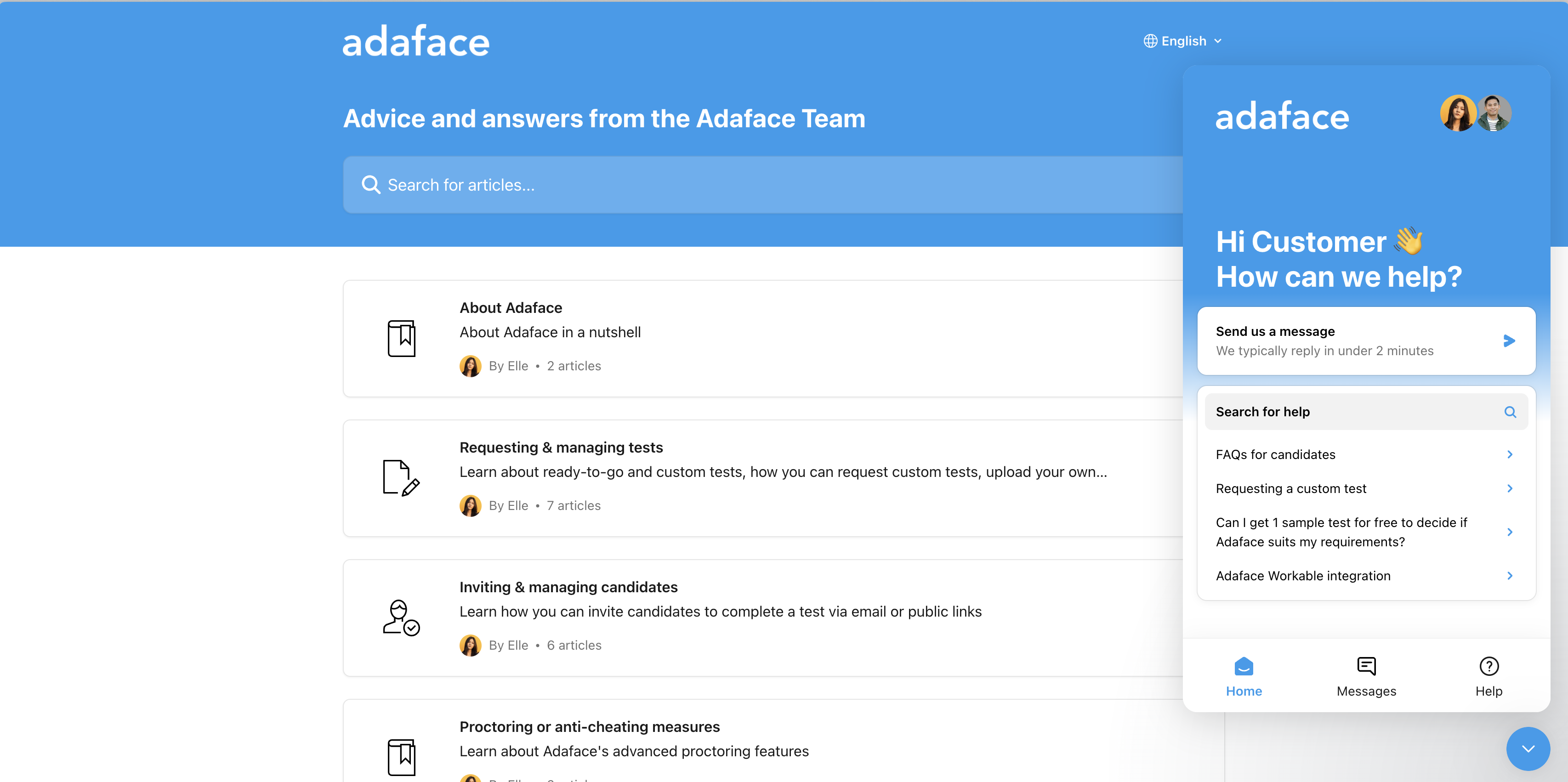
Adaface's customer support features: Adaface offers a range of support options including email support, live chat, and an extensive help center. This ensures that recruiters have multiple channels to get their questions answered quickly.
For those on enterprise plans, Adaface provides dedicated priority support. This means having a direct point of contact for any issue resolution, making the experience smoother for larger organizations.
Adaface also offers thorough training and onboarding sessions. New users can gain insights on how to maximize the platform's features, ensuring a seamless integration into their hiring process. Learn more about Adaface features or take a product tour.
Thomas's customer support features
Thomas offers email support for users who need assistance with their assessment platform. They also provide a phone line for sales inquiries.
While email support is available, Thomas lacks real-time communication options like live chat. There's also no self-service knowledge base or help center for quick answers to common questions.
Comparison of customer support
Adaface vs Thomas: Conclusion
Both Adaface and Thomas offer pre-employment assessments to evaluate candidates. They provide aptitude tests, personality assessments, and situational judgment questions to screen applicants.
Adaface stands out by offering a wider range of assessment types. This includes coding tests, job-specific skill assessments, and customized tests tailored to each role.
Thomas focuses more on personality and aptitude testing. It lacks options for evaluating technical skills or role-specific knowledge that many companies need.
Streamline hiring with skill tests
Adaface provides a more complete candidate evaluation with its diverse test library. Companies can assess both hard and soft skills in one platform.
Pre-employment assessments help companies hire better by providing objective data on candidates' abilities. This leads to more informed decisions and better quality hires.
The right assessment platform should match your specific hiring needs and the types of roles you're filling. Consider the breadth of tests offered and customization options.
Adaface offers the flexibility to evaluate a wider range of skills and roles. To see how it could improve your hiring process, check out our plans or try a free trial.
Adaface vs Thomas FAQs
Adaface offers a broader range of tests, including programming, business, language, and AI tests, while Thomas focuses mainly on aptitude and personality assessments.
No, Thomas does not offer coding assessments. Adaface provides both MCQs and hands-on coding questions for technical roles.
Adaface offers more advanced anti-cheating features like web proctoring, webcam monitoring, and plagiarism detection, which Thomas doesn't provide.
Adaface offers transparent pricing plans on their website, including a free trial. Thomas requires contacting their sales team for a quote.

40 min skill tests.
No trick questions.
Accurate shortlisting.
We make it easy for you to find the best candidates in your pipeline with a 40 min skills test.
Try for freeRelated posts



